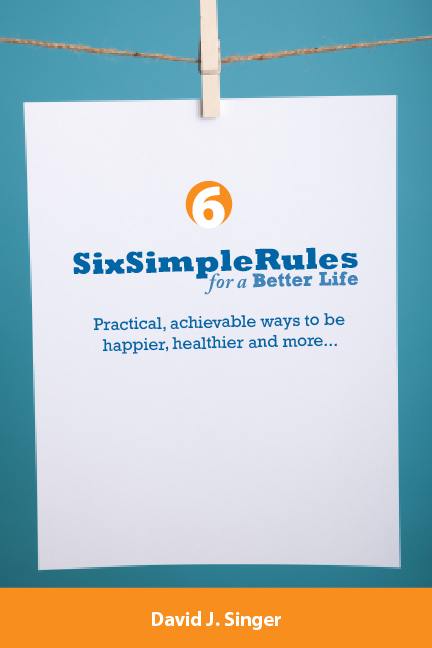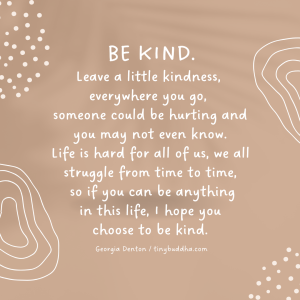Note: This winners for this giveaway have already been chosen. Subscribe to Tiny Buddha for free daily or weekly emails and to learn about future giveaways!
The Winners:
It’s often occurred to me that the most important components of my peace and happiness are actually quite simple. When I start feeling overwhelmed or unbalanced, it’s generally because I’ve complicated things and lost touch with what truly matters.
This is precisely why I loved reading David J. Singer’s book Six Simple Rules for a Better Life: it offers practical wisdom by focusing on the simplest of ideas—which we nonetheless forget at times—and includes concrete suggestions to make incremental change across multiple areas of our lives.
David writes in a warm, down-to-earth tone, and shares his experiences, insights, and, most importantly, his humanity with candor, which makes the book easily digestible and accessible.
I’m excited to share a little about David and Six Simple Rules for a Better Life, and also offer two free autographed copies.
The Giveaway
1. Leave a comment below, noting one “rule” or guideline that you’ve adopted for your health and happiness.
2. Tweet: RT @tinybuddha GIVEAWAY and Interview: Six Simple Rules for a Better Life http://bit.ly/x0zZM4
If you don’t have a Twitter account, you can still enter by completing the first step. You can enter until midnight PST on Friday, January 6th.
The Interview
1. You’re an author, speaker, and former workshop leader for high school students. Can you tell us a little more about yourself?
I love being a dad, a husband, a son, a brother, a community member, and a friend. I also love spending much of my time with smart, interesting, and wonderful people in my day job running a service business.
I love sports, music, and reading. I love to learn and grow and to help other people learn and grow. A good friend calls me a learnaholic and I used that to describe myself on the first page of my book.
2. What inspired you to write Six Simple Rules for a Better Life?
Nothing feels better than knowing that I’ve made a difference in other people’s lives. I’ve always tried to help family and friends, and I derived great satisfaction working with the high school students you referred to in your first question. I wrote Six Simple Rules for a Better Life to be able to help a wider audience.
3. What are the six simple rules?
Be happy, Be nice, Be a leader, Be organized, Be a lifelong learner, and Be healthy.
4. You’ve written that your book is not like other self-help books. What makes it different?
People who write self-help books often come across as super-beings. While it’s nice to be able to look up to them, their seeming perfection can make their suggestions seem unachievable.
I’m no super-being. I readily acknowledge experiencing frustration, failure, stress, and anxiety like everyone else. And I make mistakes. Plenty of them. I work hard to learn from my mistakes. And then I share that learning with everyone I know.
Another friend, after reading the first draft of the book, said to me that he loved my book because it’s unlike other self-help books that “tout all kinds of grand changes that end up oppressing you, making you feel so guilty that you avert your eyes as you walk past the shelf where they sit and accusingly call out to you, Why aren’t you following our instructions?”
My book, instead, is filled with practical, achievable suggestions for all kinds of ways that you can improve your life, along with a method for making changes that stick.
5. One thing I love about your book is that you write in an accessible, down-to-earth tone and you offer suggestions to create positive habits starting right now. What would you say is the most important habit for happiness?
I’m a big fan of the work of Richard Carlson and Viktor Frankl. From their teachings, I have learned about the power of our thinking.
“The power of negative thinking” is something I talk about when I give speeches. No one has heard that phrase, but everyone is familiar with the results of negative thinking—stewing over minor slights and inconveniences, being snippy with the ones you love, and general unhappiness.
When we learn that our thinking has everything to do with our emotions, we can be happier by recognizing when our thoughts are running away from us, bringing ourselves back into the present moment, and reminding ourselves not to sweat the small stuff and to be grateful for what we have.
6. Your second rule is “Be nice.” I think most of us might consider this common sense, and yet we also struggle with this at times. What do you think is the main reason we struggle to be good to each other?
All of us are so busy—we have so much on our minds that it’s very challenging to live in the present moment. We spend a lot of time thinking about things that have happened in the past, or thinking (and often worrying) about the future. If we’re not present, it’s easy to let those “Be nice” habits slip. That’s why I wrote a whole chapter filled with ideas for ways to be nice.
7. Another of your rules is “Be a leader.” How do you define “leader”—and do you think leadership is something that is accessible to everyone?
When I was writing the book and told a friend about “Be a leader,” he said, “I don’t think everyone can be a leader.” I explained that I wasn’t talking about world leaders and company CEOs; that the leadership I was writing about includes making the world a better place even in “small” ways.
Being a leader is about getting involved in your community. It’s about setting an example and taking on responsibility. It’s about the role you play in your family. In answer to your question—yes, we all have it in us to be a leader.
8. You’ve written that we need to slow down to make changes. What do you think is the main reason we often struggle to make real, lasting change?
We live in a world filled with offers for immediate change. “Get rich quick,” “get thin now,” “stop smoking today.” Those quick fixes, when they do work, rarely last. In the same way, we’re encouraged each year to make New Year’s resolutions—grandiose plans, which nearly always fail.
You know how it works—gym memberships spike in January and then those same gyms’ parking lots are empty by February. The secret to making real, lasting change is to slow down to make changes.
Instead of creating the once-a-year, New Year’s resolutions type of list, the better way is to create and maintain a running list of goals—an ongoing list of life-improvement ideas. Then, because it takes 21 days to form a new habit, slow down and focus on one new habit every 21 days. This slow and steady approach is extremely effective and adds up to the positive changes we all want.
9. You also suggest we need to take time to celebrate our progress. Why is this so important?
Looking forward to more accomplishments is a great motivator and a list of goals is great raw material for our progress. But it’s important that we don’t end up seeing the list of goals as a list of shortcomings.
Even someone who would not be officially labeled as a perfectionist likely suffers to some extent from the perfectionist mentality, frustrated by all that they haven’t accomplished—and that’s a negative, unhappy place to be. Toward that end, it’s important to make a second list—a list of achievements—and to stop and celebrate our progress every day, looking back at all that we’ve accomplished. We deserve it.
10. What is the main message you hope readers take from your book?
I could say this any time of year, but it’s especially poignant in January, when people are already struggling with their New Year’s resolutions: As we discussed before, the way to real, lasting change is to slow down.
We’ve all heard the saying, “life is short” and that we have to “stop to smell the roses.” I agree. But I’ve also learned that “life is long,” meaning that we have time, and that we don’t have to try to make a million changes all at once—which can leave us so overwhelmed that we make none. If we slow down to make changes we’ll accomplish much more.
I talked before about focusing on one new habit every 21 days. Even if you slow down further (for example, one new habit every month, or every six weeks), you can experience many positive changes this year, and an awesome number in the years ahead. The years will go by anyway. You might as well make those changes. And you can. We all can.
Read more about Six Simple Rules for a Better Life on Amazon.
FTC Disclosure: I receive complimentary books for reviews and interviews on tinybuddha.com, but I am not compensated for writing or obligated to write anything specific. I am an Amazon affiliate, meaning I earn a percentage of all books purchased through the links I provide on this site.
About Lori Deschene
Lori Deschene is the founder of Tiny Buddha. She started the site after struggling with depression, bulimia, c-PTSD, and toxic shame so she could recycle her former pain into something useful and inspire others to do the same. You can find her books, including Tiny Buddha’s Gratitude Journal and Tiny Buddha’s Worry Journal, here and learn more about her eCourse, Recreate Your Life Story, if you’re ready to transform your life and become the person you want to be.
- Web |
- More Posts














 Though I run this site, it is not mine. It's ours. It's not about me. It's about us. Your stories and your wisdom are just as meaningful as mine.
Though I run this site, it is not mine. It's ours. It's not about me. It's about us. Your stories and your wisdom are just as meaningful as mine. 